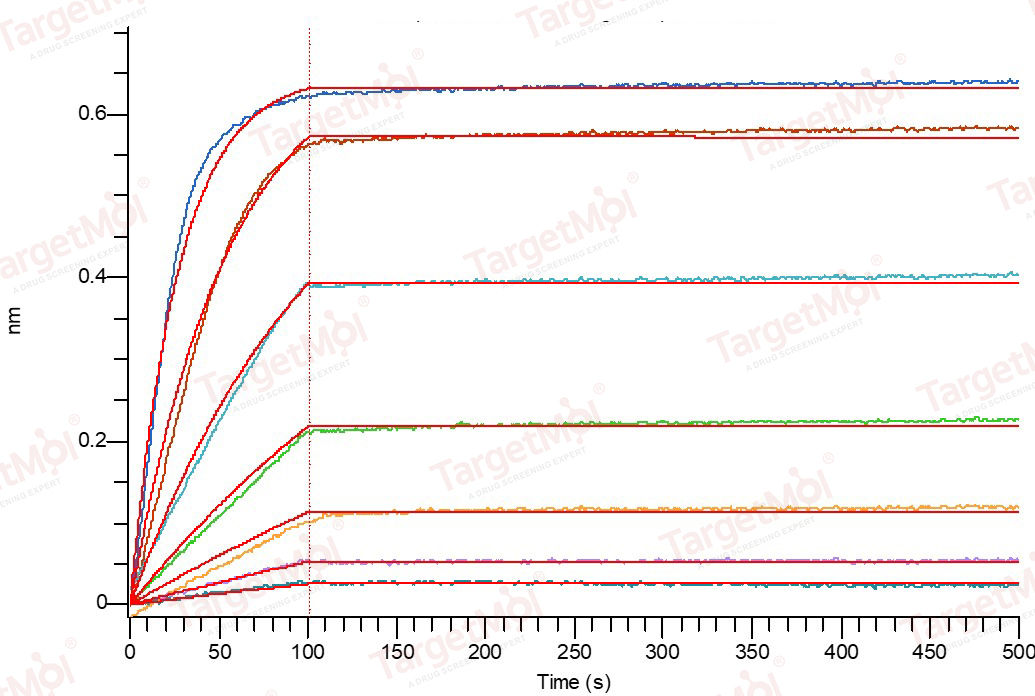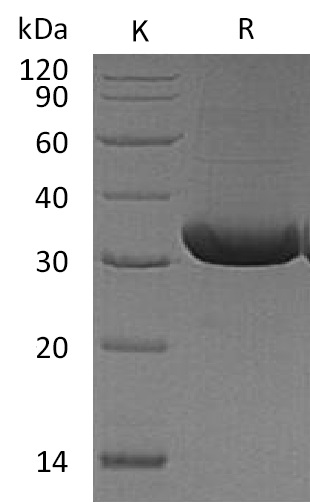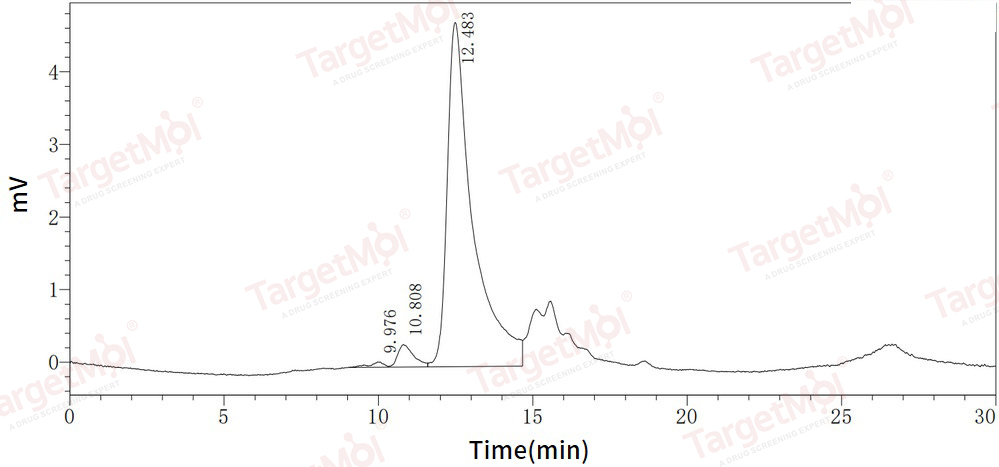Shopping Cart
Remove All Your shopping cart is currently empty
Your shopping cart is currently empty
RANKL/TNFSF11/CD254 Protein, Mouse, Recombinant (His) is expressed in HEK293 mammalian cells with N-6xHis tag. The predicted molecular weight is 30-35 KDa and the accession number is BAA97257.1.

| Pack Size | Price | USA Warehouse | Global Warehouse | Quantity |
|---|---|---|---|---|
| 5 μg | $74 | 7-10 days | 7-10 days | |
| 10 μg | $118 | 7-10 days | 7-10 days | |
| 20 μg | $187 | 7-10 days | 7-10 days | |
| 50 μg | $350 | 7-10 days | 7-10 days | |
| 100 μg | $497 | 7-10 days | 7-10 days | |
| 200 μg | $738 | 7-10 days | 7-10 days | |
| 500 μg | $1,220 | 7-10 days | 7-10 days |
| Biological Activity | Loaded Recombinant Human OPG-Fc on Pro A Biosensor, can bind Mouse RANKL-His with an affinity constant of 1.02 pM as determined in BLI assay. (Regularly tested)  |
| Description | RANKL/TNFSF11/CD254 Protein, Mouse, Recombinant (His) is expressed in HEK293 mammalian cells with N-6xHis tag. The predicted molecular weight is 30-35 KDa and the accession number is BAA97257.1. |
| Species | Mouse |
| Expression System | HEK293 Cells |
| Tag | N-6xHis |
| Accession Number | BAA97257.1 |
| Synonyms | Tumor necrosis factor ligand superfamily member 11,TRANCE,Tnfsf11,TNF-related activation-induced cytokine,Receptor activator of nuclear factor κ-B ligand,Receptor activator of nuclear factor kappa-B ligand,RANKL,Osteoprotegerin ligand,Osteoclast differentiation factor,OPGL,ODF,CD254 |
| Amino Acid | Arg43-Asp287 |
| Construction | Arg43-Asp287 |
| Protein Purity | Greater than 90% as determined by reducing SDS-PAGE. Greater than 90% as determined by SEC-HPLC.   |
| Molecular Weight | 30-35 KDa (reducing condition) |
| Endotoxin | < 0.1 ng/µg (1 EU/µg) as determined by LAL test. |
| Formulation | Lyophilized from a solution filtered through a 0.22 μm filter, containing 20 mM Hepes-NaOH, 50 mM NaCl, 6% Trehalose, 4% Mannitol, 0.05% Tween 80, pH 8.0. |
| Reconstitution | Reconstitute the lyophilized protein in distilled water. The product concentration should not be less than 100 μg/ml. Before opening, centrifuge the tube to collect powder at the bottom. After adding the reconstitution buffer, avoid vortexing or pipetting for mixing. |
| Stability & Storage | Lyophilized powders can be stably stored for over 12 months, while liquid products can be stored for 6-12 months at -80°C. For reconstituted protein solutions, the solution can be stored at -20°C to -80°C for at least 3 months. Please avoid multiple freeze-thaw cycles and store products in aliquots. |
| Shipping | In general, Lyophilized powders are shipping with blue ice. Solutions are shipping with dry ice. |
| Research Background | Mouse tumor necrosis factor ligand superfamily member 11(Tnfsf11) is a member of the tumor necrosis factor (TNF) cytokine family. Tnfsf11 is widely expressed in cells including T cells and T cell rich organs, such as thymus and lymph nodes. This cytokine can bind to TNFRSF11B/OPG andTNFRSF11A/RANK. Tnfsf11 is involved in a number of fundamental biological processes such as acting as regulator of interactions between T-cells and dendritic cells, the regulation of the T-cell-dependent immune response and enhancing bone-resorption in humoral hypercalcemia of malignancy. It augments the ability of dendritic cells to stimulate naive T-cell proliferation. |
| Size | Quantity | Unit Price | Amount | Operation |
|---|

Copyright © 2015-2025 TargetMol Chemicals Inc. All Rights Reserved.